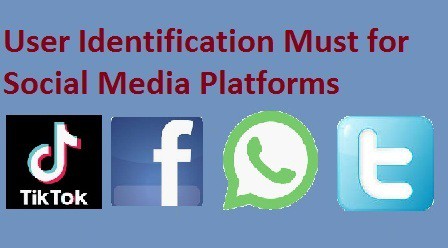
Social media platforms to implement User Identity Verification
- As per this requirement, social media platforms have to impact user verification mechanism
- This is in-line with the new bill Personal Data Protection Bill approved by Union Cabinet few days ago
Indian government is leaving no stone un-turned when it comes to data privacy and preventing spread of fake news. Data protection and putting a check on the spread of fake news is very important when it comes to social media platform like WhatsApp, Facebook, Twitter etc. India is one of the largest user of these social media platforms and a lot of data has been shared on these apps. Hence its very important to put a check on the flow of information. On that note, the government has made it mandatory for these social media platforms to implement user identity verification.
This will require these platforms to offer an identity verification option. These social media platforms have to provide a mechanism for users to prove their identities. These identity information will be needed to displayed publicly. This is very much similar to the blue check mark present on Twitter to prove the identity of high profile persons which includes celebrities, politicians, big businessmen etc. This requirement is expected to create a lot of issues in terms of technicalities and policies. All these social media giants, Facebook, WhatsApp, Instagram units, Twitter and Chinese app TikTok have a subscription of millions of Indian users.
However this verification mechanism is optional for users and they may decide not to opt for it.
Reasons: Social media platforms to implement User Identity Verification
The Personal Data Protection Bill will change the way may social media platforms operate in India. They may have to now comply with the data storage and data processing norms laid down in the bill. This bill is intended to target many of the fake and anonymous account that accounts for most of the misleading and incorrect information. Such kind of information and its spread elsewhere may lead to lot of tensions and discomfort among the people.
“Targeted at disinformation and fake news”, this is one of the most ambitious clause globally to prevent such occurrences. “The idea was to reduce the spread of fake news and online trolling,” said one of the sources, a federal IT ministry official. Even before this bill was bought into public domain, these companies have put some measures voluntarily to stop spread of fake news. WhatsApp has put a limit on the group forwarding of the messages.
However not all these companies have welcomed this move by the government saying that verification process will be too lengthy and require a lot of information. People in many other countries might not be able to furnish this information or they may be reluctant to provide all such details. They are also of the view that identity verification may not completely stop the spread of fake news.
Personal Data Protection Bill has some exemption for media
The bill exempts journalists from some of the rules of the bill. They have to still comply with the exiting code of ethics laid down by the Press Council of India or “any media self-regulatory organisation.” They have been provided the freedom to write or express opinions which involve use of sensitive personal data. The I&B ministry had recently announced its intent to make amendments to the Press Registration Bill, by removing prosecution as a punishment for “erring publishers,” making the registration of newspapers a centralised process, and also seeking compulsory registration of online news websites and e-papers with the Centre.
As per the sources, journalists while doing their job might need to collect and process information which might have some personal or sensitive data. At some critical times, it is not expected from them to get the voluntary consent from the concerned party. They may also have to collect information which they may not actually need or publish. The bill prohibits such information collection but media domain is exempted from this clause also. The Press Council has had a comprehensive code of ethics for journalists since 1978, clearly specifying what constitutes “right to privacy”, its general secretary, CK Nayak, said.
In short, the Personal Data Protection Bill is a great move by the Indian Government. Time will only tell when it is tables before the Parliament and when it gets the President’s nod.